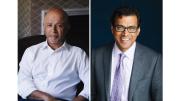ONLINE ENHANCEMENTS
![]() Check Harvard Magazine’s website regularly for breaking University news (and news of alumni) plus multimedia material complementing articles. Hear poet Richard Wilbur read from his work, and cellist Matt Haimovitz perform. Find out more about your risk for diabetes. And learn what Harvard experts think about the unfolding financial crisis—a different kind of risk.
Check Harvard Magazine’s website regularly for breaking University news (and news of alumni) plus multimedia material complementing articles. Hear poet Richard Wilbur read from his work, and cellist Matt Haimovitz perform. Find out more about your risk for diabetes. And learn what Harvard experts think about the unfolding financial crisis—a different kind of risk.
THE ECONOMIC AGENDA
I was pleased to see Professor Summers (“The Economic Agenda,” September-October, page 27) draw the connection between the long-term income stagnation of the bulk of the U.S. population and the growing competition with a global labor market. It is clear that the laws of supply and demand have deprived most U.S. employees of market power, a phenomenon that started with the ranks of the unskilled and under-educated but that has moved up scale as developing nations have produced a flood of new college graduates. This has predictably led to the rich getting richer, since they are no longer compelled to share. It is unfortunate that Summers then goes on to propose a destructive and impractical solution to one of the primary accelerators of that phenomenon.
It is clear that the U.S. corporate tax system, which provides an incentive of up to 35 percent for locating high-value operations outside of our borders, has done much to drive away the high-value jobs that were supposed to remain here. Summers proposes that we address that problem by conspiring with all foreign nations to impose a 35 percent tax on all corporations everywhere. Given that countries such as Singapore, Ireland, and Switzerland have produced extremely prosperous middle-class populations by keeping corporate rates low, it seems hardly likely that they would agree. Further, both left- and right-wing economists agree that the corporate tax is an extremely distorting and inefficient way to collect revenue. Instead, the U.S. could unilaterally enact a corporate dividends-paid deduction, offsetting the revenue loss by eliminating capital-gains preferences (another huge and regressive distortion) and imposing a 7.5 percent incremental levy on individual income over $500,000. This would restore employee market power while substantially improving the efficiency of our economy.
Matt Lykken, J.D. ’85
Wheaton, Ill.
Am I the only one who thinks that spending a trillion dollars a year on the military-industrial-spy-torture complex is a factor in determining the economy’s trajectory, when we could get by with a paltry $500 billion or so? Larry Summers certainly doesn’t seem to. Amid all his financial mumbo-jumbo, not one word. I mean, I made only a B in Ec 1, yet that seems kind of obvious to me.
Rudolf Dankwort ’62
Phoenix, Ariz.
Summers makes some excellent points in his article, particularly regarding the advantages of global trade and trade agreements. After all, most of our manufacturing jobs have disappeared due to CAD/CAM, “snap together” rather than “screw together,” and plastic replacing metal—not because of “outsourcing.” Some “outsourcing” is due to a lack of highly qualified Americans.
His otherwise objective assessment loses me when he accepts global warming theories and fails to accept that any expensive programs we adopt will be overcome by emissions from China, India, Russia, and Africa. Except for France (80 percent of electricity from nuclear power), Europe and Canada have not come close to meeting their Kyoto commitments.
Most distressing, Summers seems to advocate more taxes to support a bigger role for government and seems to think it will be feasible for poor countries to sign trade agreements requiring them to adopt “international standards for capitalization of financial institutions, for corporate-income taxation, and for labor standards and organizing” with costs similar to those in the U.S. We should be encouraging Americans to become skilled professionals or artisans and to work hard, but we must not encourage an “entitlement” mentality.
Robert C. Armour, M.B.A. ’67
Virginia Beach, Va.
I’m a long-time admirer of former President Summers, but one point in his “economic agenda” article is a perfect example of what’s wrong with the center-left consensus characterizing so much Harvard thinking. He says, “I have been emphasizing healthcare as a moral imperative,” then identifies the main problem with U.S. healthcare as “costs consistently growing far more rapidly than GDP.”
The view of healthcare as a “moral imperative,” and hence an entitlement, is the direct cause of costs consistently growing more rapidly than GDP. We need a reasonably healthy workforce to compete in the world. We already have that.
Marguerite Gerstell ’66, A.M. ’91
Stonington, Me.
ENRON ECHOES
Paul M. Barrett sounds several alarms in his review of Professor Salter’s book on the Enron collapse (“Felonious Mayhem,” September-October, page 20). Most shockingly, Barrett reminds us of the failure of our universities. He asks how many business schools would dispute the assertion of Enron’s Ken Lay: “all that matters is money.” My conclusion is that today’s universities are chiefly trade schools and the most prestigious “trade” is making money. We have come a long way from John Henry Newman’s 1852 idea that the “practical end” of a university must be “training good members of society.” Barrett reminds us also of the need for capable and principled watchdogs to protect us from ever-present economic predators. We had our corporate malefactors when I was a schoolboy. But public accountants (auditors) were then viewed as a secular priesthood, albeit too often unheeded, like their churchly counterparts. Then came the Depression and New Deal, when principled journalists like Marquis Childs and regulators like Thurman Arnold were heroes in my collegiate circles. During World War II, soldiers like me relied on businessmen like Paul Hoffman and HBS professors like Colonel Doriot to keep us supplied. Like Paul Barrett, I long for a return to days when money was a measure, not an end.
John M. Pickering, M.B.A. ’43
Albuquerque, N.M.
LET ’EM EAT AIR POLLUTION
The article about China’s growth correctly describes a serious pollution problem (“Greening China,” September-October, page 32), but the question whether 750,000 or 710,000 die of pollution is meaningless without considering the saving of lives resulting from taking workers out of bitter, inefficient subsistence farming, with pandemic liver fluke and other diseases of poverty, into relatively less dangerous (and better fed) industrial work (even if not under optimal conditions). Without diminishing the imperative for China to reduce pollution, the short-term perspective must include whether the lifespan and life quality of the Chinese were improved on a net basis by the environmentally insensitive growth.
James Kardon ’71
Scarsdale, N.Y.
ENLIGHTENED ENGINEERING
As a degreed engineer with a contemporaneous degree in philosophy, I read with interest your piece on Venky Narayanamurti (“The Liberal Art of Engineering,” September-October, page 59). As it happens, my undergraduate degrees are from the University of Notre Dame, which offers a standardized five-year engineering/arts and letters dual-degree program and has done so at least since I attended the university in the late 1970s. I have always felt that the broadened perspective the program afforded me has been crucial to any subsequent professional or personal success I have had, and more importantly, to the joy I am able to experience whether I’m approaching a new subject in the sciences or in the arts. Venky is definitely onto something, but at the risk of committing some great heresy, I will suggest that Harvard explore the possibility that another fine institution of higher learning has trod this ground before and come up with a superb solution, one that Harvard might profitably adopt.
Michael Hogan, M.B.A. ’88
Boston
INEQUALITY, CONTINUED
When I read the article on income inequality (“Unequal America,” July-August, page 22), I expected to see in response some outraged letters from people who are shocked and offended that anyone would wish to set any limits on runaway greed and its attendant wanton disregard for the suffering of others. [See letters, September-October, pages 2-7, 80.] I was not disappointed.
Peter Rees, Ed.D. ’64
Trenton, Me.
I read with interest the article “Unequal America” and the letters responding to it. Perhaps I might just add a footnote. The story is told of how a man once came up to Lord Rothschild and berated him for having an unfair share of the world’s wealth. Lord Rothschild called over his secretary. “Hoskins,” he said, “give this man his share of my wealth. Give him seven pence.”
Stefan Schreier, Gp ’67
Spokane, Wash.
JAPANESE ARCHITECTURE
“Works and Woods,” by Paul Gleason (September-October, page 44), offered fresh insight into the use of wood in traditional Japanese architecture through a glimpse of the work of associate professor Yukio Lippit. A brilliant example of the sukiya style of Japanese architecture is seen on page 48 in the photograph of the seventeenth-century Katsura Villa; the author remarks that Katsura was “built for the friends of the imperial family.” Certainly, Katsura was a courtly gathering-place: this villa was in fact built for Prince Toshihito (1579-1629) during the reign of his nephew, Emperor Gomizunoo.
The facing, interior view on page 49, also in the sukiya style, is not that of Katsura Villa as the caption suggests. This is, rather, the Kyaku-den, from the middle villa of Shugakuin Villa, built after Katsura for Emperor Gomizunoo.
Thank you for including images of these beautiful spaces in your article.
Murray Barsky
Administrative Coordinator for
Harvard College Library Technical Services
Cambridge
PAUL GLEASON REPLIES: Thank you to Murray Barsky for this careful review of the article. The top picture on page 49 was incorrectly identified as Katsura Villa. Although Corbis, the agency from which we bought the rights to use the image, had labeled it “Katsura Rikyu Imperial Villa,” it was in fact a photograph of Shugakuin Villa, built years later; we are glad to have the error corrected. Professor Lippit concurs with my characterization of Toshihito as more a friend of the imperial family than an actual part of it, even though he had the title of “prince.”
ROTC, CONTINUED
I was commissioned into the U.S. Navy from NROTC at Harvard almost 50 years ago. I write these lines on August 28, the forty-fifth anniversary of Martin Luther King Jr.’s immortal speech; I was present in Washington because I had left active duty in Norfolk, Virginia, the day before for that very purpose. I last wore the uniform, as a Reserve officer, upon graduating from Michigan Law in 1966.
But every day of a legal and business career as well as a long career of civic life—local, national, and international—I have been governed by John Paul Jones’s “Code of a Naval Officer” that was presented to me and my brother officers when we were commissioned in June 1959; it is framed outside my office. That code charges an officer to be—and I quote the archaism of the eighteenth century—“a gentleman of liberal education, refined manner, punctilious courtesy, and the nicest sense of personal honor.” Only Harvard and later Michigan can claim to have endowed me with the first. The next two are in the eye of the beholder. The “nicest sense of personal honor” I claim and will defend to the end of my days.
I didn’t get that from Hollis Hall or Adams House, from the history, government, or English departments, or from WHRB. I got it from NROTC and from many a senior, peer, and subordinate sailor, soldier, and Marine on high seas and landing beaches in what Marines call “many a clime and place.”
None of these virtues is “military” in the standard civilian understanding of that term. But they go to the very essence of what Harvard used to instill in its young, and what Presidents Summers and Faust have wanted to instill again. [See “Principles We Must Strive to Extend,” excerpted from President Drew Faust’s June 4 remarks at the ROTC commissioning ceremony, July-August, page 53, and letters, September-October, pages 81-82.] They are the virtues of an honorable private and public citizen and leader, and of an honorable member of family and community. “Liberal education, refined manner, punctilious courtesy, and the nicest sense of personal honor” is what we are or should be all about.
Are these virtues now instilled by the College, the Business School, the Law School, or any other of Harvard’s famous centers of learning and leadership?
Terence Roche Murphy ’59, O.L., O.B.E.
Ex-LT USN/USNR
Bethesda, Md.
ERRATA AND AMPLIFICATIONS: MONGOOSE AND MORE
D. Allan Gray, M.B.A. ’79, of Chicago, writes that in “Man, Mongoose, and Machine” (September-October, page 11), on “Thrishantha Nanayakkara’s work in training mongooses to detect mines, you describe similar work with rats and add that ‘Nanayakkara hopes that determining how another rodent’s brain sorts smells will lead to improved training techniques that in turn will make his country [Sri Lanka] a safer place to live.’ Alas, a mongoose is not ‘another rodent’: it is a member of the family Viverridae or Herpestidae—taxonomists differ—but in any event indisputably a carnivore, not a rodent.” Attorney Thomas L. Higginson Jr. ’72, writes to the same effect, observing that the mongoose “is more closely related to a walrus than to a rat.” The editors can only confess that we knew the mongoose was not a rodent, but our copyediting failed to ferret out the misattribution of kinship.
In response to “Unequal America,” by Elizabeth Gudrais (July-August, page 22), Katherine Yocum, Ed.M. ’01, of Portland, Oregon, notes that Ethiopia “is one African nation which has never been colonized.” And Mark Moody ’93, corresponding from Vienna, Austria, disputes that the federal income tax “dated only to 1913 in the United States. In fact, it was under Abraham Lincoln that this misery was first inflicted upon us—on August 5, 1861, by signing the Revenue Act. Strapped for cash with which to pursue the Civil War, Lincoln and Congress had conspired to impose a 3 percent tax on annual incomes over $800. This tax was not repealed until the Grant administration, in 1872. In 1894, Congress again attempted to levy a flat tax on income, but it was ruled unconstitutional by the Supreme Court in 1895; it was this ruling that was the genesis of the Sixteenth Amendment, which empowered the government to levy taxes on individuals, irrespective of a state’s population.”
SPEAK UP, PLEASE
Harvard Magazine welcomes letters on its contents. Please write to “Letters,” Harvard Magazine, 7 Ware Street, Cambridge 02138, send comments by e-mail to yourturn@harvard.edu, use our website, www.harvardmagazine.com, or fax us at 617-495-0324. Letters may be edited to fit the available space.





